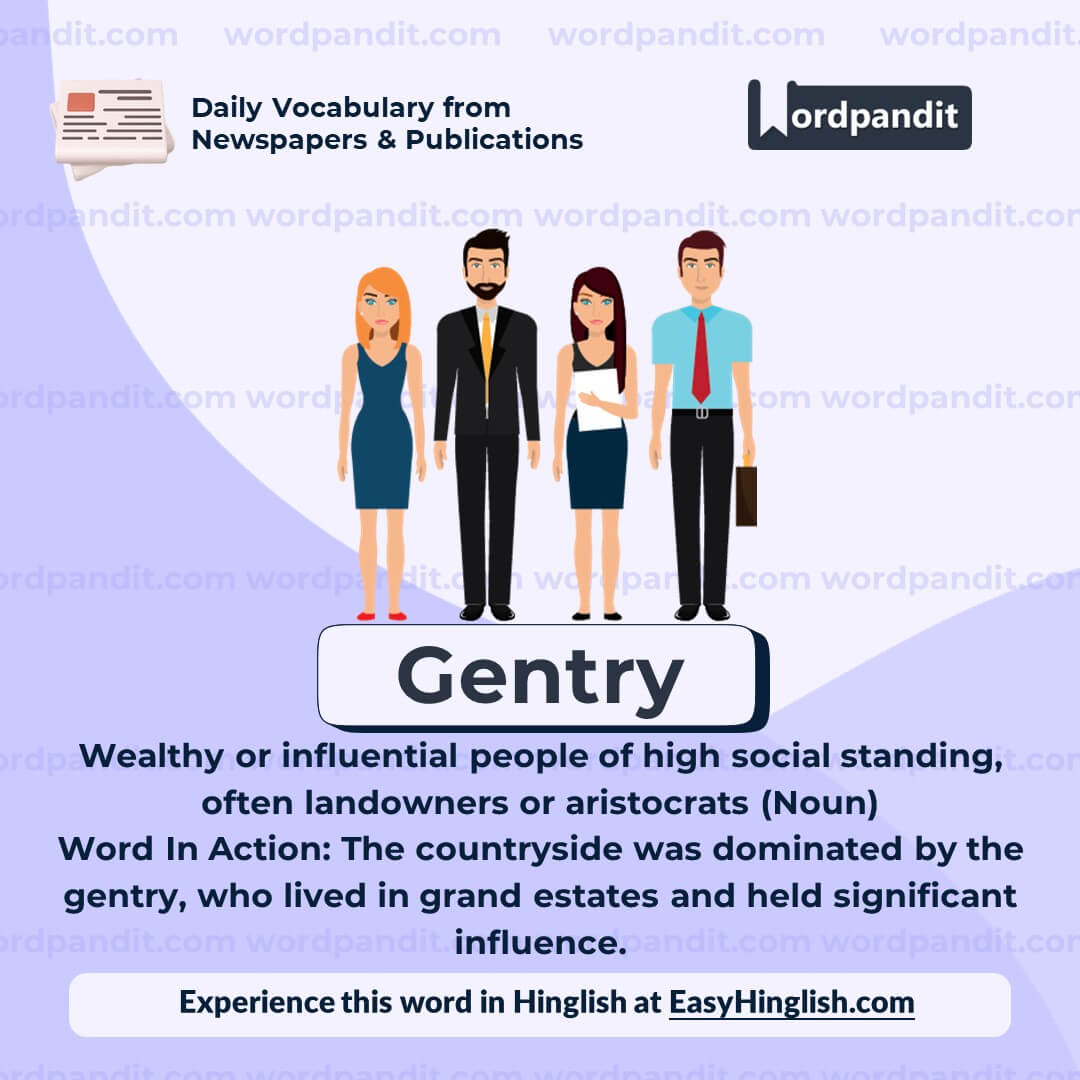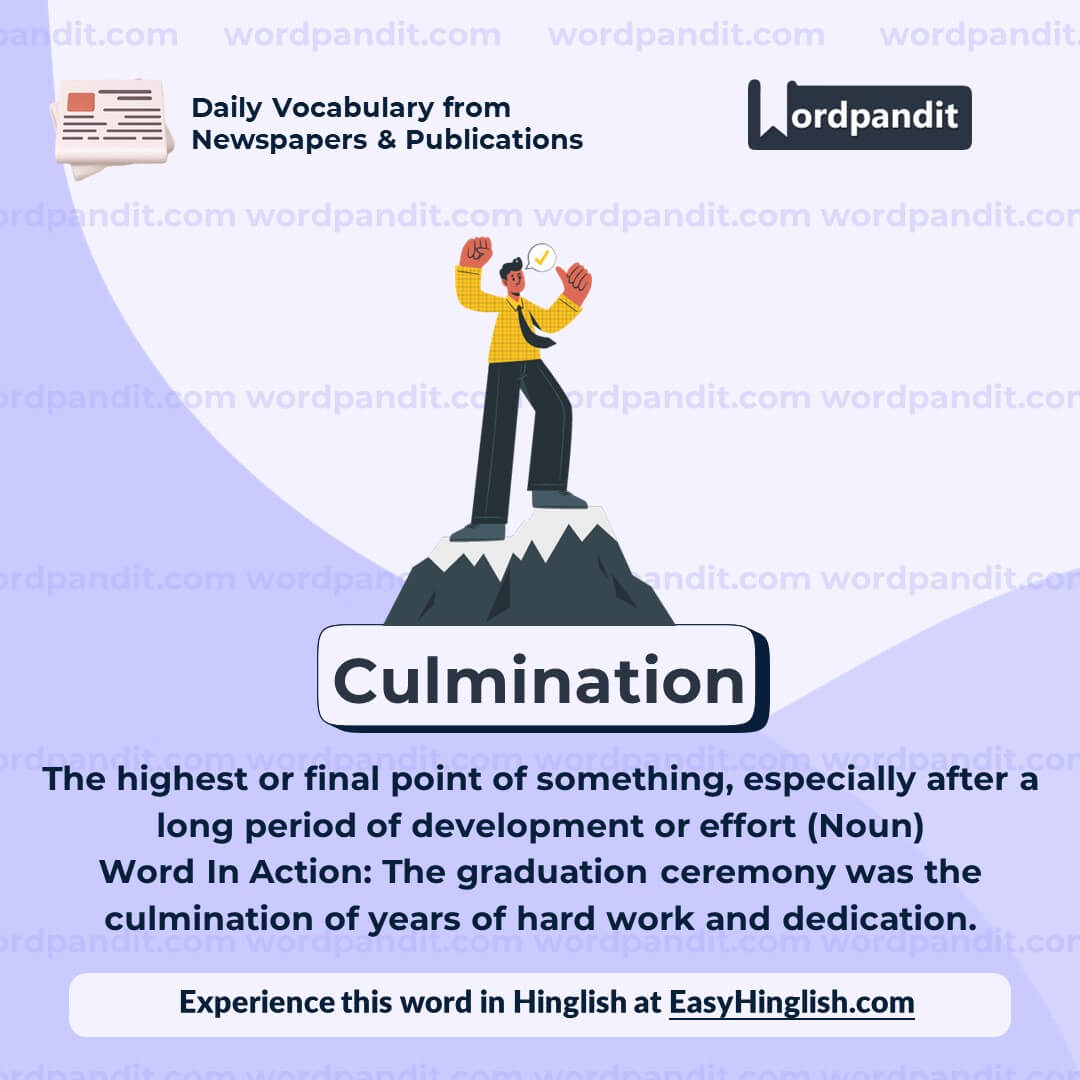Daily Vocabulary from International Newspapers and Publications
Expand Your Vocabulary with Wordpandit’s Global Vocabulary Hub
At Wordpandit, we are committed to helping you develop a truly global vocabulary by drawing from some of the most respected international publications. This section is designed to keep you ahead of the curve by introducing you to words that define global conversations and trends.
The Power of Global Sources
To help you think and communicate on a global scale, we curate vocabulary from renowned international sources, such as:
- The New York Times
- The Washington Post
- BBC
- The Guardian
- The Economist
- Scientific American
- Psychology Today
- And many more...
Stay Global, Stay Competitive
Our daily updates from international publications ensure you are consistently exposed to new words that reflect global news and developments, making sure your vocabulary is not only current but also globally relevant.
Enhance Your Global Perspective
Whether you’re preparing for international exams, aiming to excel in global business communication, or want to enhance your language skills for personal growth, Wordpandit offers the resources you need to thrive in a global context.
Effective Learning, Global Reach
Our learning methodology combines global examples, memory aids, and interactive activities, allowing you to internalize new words effectively and apply them in real-world scenarios.
Begin Your Global Vocabulary Journey Now!
Why Choose Wordpandit?
Practical Learning: Focus on words you'll actually encounter in real-world reading, enhancing your comprehension and communication skills.
Diverse Content: From current affairs to scientific breakthroughs, our varied sources expose you to vocabulary across multiple domains.
Effortless Integration: Make Wordpandit a part of your daily routine. Just a few minutes each day can significantly boost your lexicon over time.
Your Path to Vocabulary Mastery
- Visit our Daily Vocabulary section regularly
- Explore new words and their usage in context
- Practice incorporating these words into your own writing and speech
- Track your progress as your vocabulary expands
Start Your Journey Today
Embark on your vocabulary enhancement journey with Wordpandit. By consistently engaging with our daily posts, you'll build a robust vocabulary that serves you well in academic, professional, and personal contexts.
Remember, a word a day keeps linguistic limitations at bay. Make Wordpandit your daily companion in the quest for vocabulary excellence!
WORD-1: Purging
Context:
"Millions around the world continue to turn to Japanese gurus for help in purging their diets, closets, and living spaces of all but the most essential items. Books like Marie Kondo’s *The Life-Changing Magic of Tidying Up: The Japanese Art of Decluttering and Organizing* (2011)" - Aeon
Explanatory Paragraph:
"Purging" refers to the act of cleansing or removing unwanted or unnecessary items, thoughts, or substances to achieve a cleaner, more focused state. In the given context, it emphasizes the minimalist lifestyle where individuals declutter their surroundings to retain only essential belongings, reflecting a sense of simplicity and mindfulness.
Meaning: To rid something of unwanted elements, cleanse thoroughly. (Verb)
Pronunciation: PUR-jing
Difficulty Level: ⭐⭐⭐ Intermediate
Etymology: Derived from Old French *purger* and Latin *purgare*, meaning "to cleanse" or "purify".
Synonyms & Antonyms:
Synonyms: Cleansing, detoxifying, decluttering, eliminating, eradicating
Antonyms: Accumulating, hoarding, collecting, preserving
Usage Examples:
- She began purging her wardrobe, donating clothes she no longer wore.
- The company is purging outdated files to make room for the new digital system.
- After a tough week, he found purging his thoughts through journaling to be therapeutic.
- The detox program is designed to aid in purging toxins from the body.
Cultural Reference:
"The concept of purging gained global attention with Marie Kondo’s philosophy of 'sparking joy,' encouraging people to let go of items that no longer serve a purpose." - Aeon
Think About It:
How does purging physical belongings affect a person’s mental and emotional well-being?
Quick Activity:
Pick one drawer or shelf in your home and spend 15 minutes purging items you haven't used in the last year. Reflect on how it makes you feel.
Memory Tip:
Think of "purging" as related to "pure." Both words share the idea of cleansing or removing impurities.
Real-World Application:
In business, purging outdated or irrelevant processes can lead to increased efficiency and innovation. Similarly, in personal life, decluttering promotes clarity and a sense of control.
WORD-2: Ratification
Context:
"The ratification of the Constitution in 1788. The language of liberal rights, most notably articulated by Locke, served as the blueprint in this process." - Aeon
Explanatory Paragraph:
"Ratification" refers to the formal approval or confirmation of an agreement, treaty, or decision, often through an official process. In the context of the U.S. Constitution, ratification involved the approval of the document by the states, signifying their consent to its provisions and framework for governance. It highlights a critical step in legitimizing and enacting significant agreements or policies.
Meaning: The official approval or confirmation of a decision, treaty, or agreement, usually through a formal process. (Noun)
Pronunciation: RAT-i-fi-KAY-shun
Difficulty Level: ⭐⭐⭐ Intermediate
Etymology: Derived from Latin *ratificare*, meaning "to confirm or approve," combining *ratus* ("fixed, established") and *facere* ("to make").
Synonyms & Antonyms:
Synonyms: Approval, confirmation, endorsement, validation, authorization
Antonyms: Rejection, veto, disapproval, denial, annulment
Usage Examples:
- The treaty was sent to the Senate for ratification before it could be enacted.
- The board's ratification of the new policy was celebrated by the employees.
- Ratification of the amendments required the approval of two-thirds of the states.
- The union's members awaited ratification of the proposed labor contract.
Cultural Reference:
"The ratification of the U.S. Constitution in 1788 was a milestone in political history, representing the foundation of modern democracy and the principles of liberal governance." - Aeon
Think About It:
Why do you think ratification processes are necessary in democratic systems? What might happen without them?
Quick Activity:
Research and write a short paragraph about the ratification process of any historical treaty or agreement, highlighting its significance.
Memory Tip:
Think of "ratification" as "ratifying a decision," where the "rat" in the word suggests "reaching an agreement together."
Real-World Application:
Ratification is vital in international diplomacy, where treaties and agreements between nations require official approval to become binding, ensuring accountability and compliance.
WORD-3: Gentry
Context:
"This Anglo-Japanified aesthetic quickly percolated from the gentry to society at large. At the St. Louis World’s Fair in 1904, replicas of Japanese living spaces attracted raves from visitors, one of whom exclaimed that..." - Aeon
Explanatory Paragraph:
"Gentry" refers to people of high social class, often landowners or those with considerable influence and wealth, particularly in historical contexts. The word typically describes a societal group below nobility but above commoners. In the context provided, "gentry" represents the social elites who were often the first to adopt and propagate cultural trends, influencing broader societal norms.
Meaning: Wealthy or influential people of high social standing, often landowners or aristocrats. (Noun)
Pronunciation: JEN-tree
Difficulty Level: ⭐⭐⭐ Intermediate
Etymology: Derived from Old French *genterie*, which originates from Latin *gentilis* meaning "of the same family or clan."
Synonyms & Antonyms:
Synonyms: Aristocracy, elite, upper class, nobility, landowners
Antonyms: Commoners, peasants, working class, proletariat
Usage Examples:
- The gentry of the town gathered at the manor for the annual ball.
- In medieval England, the gentry played a crucial role in maintaining local order and governance.
- Many traditions that started with the gentry eventually permeated through all social classes.
- The novels of Jane Austen often focus on the lives and struggles of the English gentry.
Cultural Reference:
"In the 19th century, the gentry were often seen as the custodians of culture and refinement, influencing tastes in fashion, art, and architecture." - Aeon
Think About It:
How has the influence of the gentry evolved in modern society compared to historical times?
Quick Activity:
List three examples of how the gentry influenced cultural or societal norms in any historical period. Share your list with a friend or teacher for discussion.
Memory Tip:
Remember "gentry" by associating it with "gentle" and "gentleman," reflecting the refined and influential nature of this class.
Real-World Application:
In modern contexts, "gentry" can refer to influential groups that shape public opinion, such as community leaders, wealthy patrons, or cultural elites in specific industries.
WORD-4: Culmination
Context:
"Pecchioli argued that Pocock’s interpretation pictured the US as the culmination of a republican tradition originating in Europe, and in doing so it positioned Florentine republicans as one link in the chain of a global republicanism." - Aeon
Explanatory Paragraph:
"Culmination" refers to the highest or most decisive point in a process, series of events, or development. It indicates the peak or conclusion that represents the fulfillment of prior efforts or contributions. In the context provided, "culmination" describes how the United States was seen as the pinnacle of a long-standing republican tradition that evolved through various historical phases, including contributions from Florentine republicans.
Meaning: The highest or final point of something, especially after a long period of development or effort. (Noun)
Pronunciation: KUL-mi-NAY-shun
Difficulty Level: ⭐⭐⭐ Intermediate
Etymology: Derived from Latin *culminare*, meaning "to top" or "to crown," related to *culmen*, meaning "summit" or "peak."
Synonyms & Antonyms:
Synonyms: Peak, pinnacle, climax, zenith, apex
Antonyms: Beginning, start, inception, nadir, base
Usage Examples:
- The concert was the culmination of months of hard work and rehearsals.
- His promotion to CEO marked the culmination of a successful career in the industry.
- The culmination of their efforts was a groundbreaking discovery in the field of medicine.
- Winning the championship was the culmination of years of dedication and practice by the team.
Cultural Reference:
"The Apollo 11 moon landing in 1969 was the culmination of years of intense research and innovation, symbolizing the peak of the space race during the Cold War era." - Aeon
Think About It:
What events or efforts in your life might lead to a significant culmination, and how would you define that peak?
Quick Activity:
Write a short paragraph describing a moment in history, literature, or your own life that you consider a culmination. Explain why it represents the peak or conclusion of a process.
Memory Tip:
Visualize "culmination" as a "culminating" mountain peak, representing the highest point reached after a challenging climb.
Real-World Application:
"Culmination" is often used in project management to describe the successful completion of a project after meeting all milestones, serving as a useful term for professionals across industries.
WORD-5: Accumulate
Context:
"Our social anxieties, our urges to consume and accumulate, and our realisation that possessing more things doesn’t necessarily translate into more happiness." - Aeon
Explanatory Paragraph:
"Accumulate" refers to the process of gradually gathering or collecting something, often over time. It can apply to physical objects, wealth, knowledge, or even emotions. In the context provided, it highlights the human tendency to amass possessions, driven by consumption habits, even when these do not always lead to greater satisfaction.
Meaning: To gather or collect something, often in increasing amounts over time. (Verb)
Pronunciation: uh-KYOO-myoo-layt
Difficulty Level: ⭐⭐ Beginner
Etymology: Derived from Latin *accumulare*, meaning "to heap up," from *ad-* ("to") and *cumulare* ("to pile up").
Synonyms & Antonyms:
Synonyms: Gather, collect, amass, hoard, pile up
Antonyms: Disperse, distribute, scatter, deplete, diminish
Usage Examples:
- Over the years, she managed to accumulate a vast collection of rare books.
- The company has been accumulating profits steadily since its launch.
- Leaves accumulated in the yard during the autumn months.
- It's important to accumulate knowledge to prepare for the challenges of the future.
Cultural Reference:
"The concept of accumulating material possessions is a recurring theme in consumerism, often critiqued in literature and films such as *Fight Club* (1999), which questions the value of ownership in achieving happiness." - Aeon
Think About It:
What do you think drives people to accumulate things, and how can this behavior be balanced to foster happiness and sustainability?
Quick Activity:
Identify three items you've accumulated over time but no longer use. Consider donating or recycling them, and reflect on how it feels to let them go.
Memory Tip:
Think of "accumulate" as "a-cue-to-multiply," reminding you of the act of gradually gathering or adding more.
Real-World Application:
"Accumulate" is a common term in finance, where individuals are encouraged to accumulate savings or investments over time to achieve long-term goals such as retirement or purchasing a home.


















